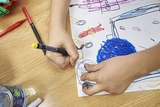

Pinching needles, painful procedures or even surgery. From a child’s perspective, the hospital is home to many scary and confusing things. The Child Life, Education and Creative Arts Therapy team was determined that the masks now worn by all Children’s Hospital of Philadelphia staff due to the coronavirus wouldn’t be one of them.
To make masks less intimidating, the team created a video showcasing masked staff members dancing to cheerful, comforting lyrics that explain the importance of masking in kid-friendly ways. They also made buttons to wear over personal protective equipment. Now patients can see staff members’ friendly faces, even when they are covered by masks.
Every day, this donor-funded department is on the front lines, helping patients and families cope with difficult diagnoses, prepare for frightening procedures and navigate hospitalization. But now, says Sherry Hughel, Child Life Manager, “There is no more important time to help make a scary, stressful situation a little less scary.”
Staying connected, staying safe
The child life team has made sure patients feel supported and connected, even while physically distancing. Families bond in their rooms through music, movement and art provided by creative arts therapists and enjoy interactive broadcasts through the hospital’s closed-circuit TV station. A few special guests have even “stopped by,” giving patients a once-in-a-lifetime opportunity to Skype with favorite celebrities, such as Eagles Head Coach Doug Pederson and Disney Channel star Emily Skinner.
The team also offers regular environmental pick-me-ups — including rainbow decorations, window clings for playing I-Spy and peaceful piano music in the hospital’s atrium — to help patients, families and staff combat stress.
The CHOP child life team provides invaluable services every day. During the unprecedented time of the COVID-19 pandemic, the department’s quick response to the heightened emotional needs of patients and families has resulted in a much-appreciated sense of normalcy, comfort and safety.
— Abbey Nash

Pinching needles, painful procedures or even surgery. From a child’s perspective, the hospital is home to many scary and confusing things. The Child Life, Education and Creative Arts Therapy team was determined that the masks now worn by all Children’s Hospital of Philadelphia staff due to the coronavirus wouldn’t be one of them.
To make masks less intimidating, the team created a video showcasing masked staff members dancing to cheerful, comforting lyrics that explain the importance of masking in kid-friendly ways. They also made buttons to wear over personal protective equipment. Now patients can see staff members’ friendly faces, even when they are covered by masks.
Every day, this donor-funded department is on the front lines, helping patients and families cope with difficult diagnoses, prepare for frightening procedures and navigate hospitalization. But now, says Sherry Hughel, Child Life Manager, “There is no more important time to help make a scary, stressful situation a little less scary.”
Staying connected, staying safe
The child life team has made sure patients feel supported and connected, even while physically distancing. Families bond in their rooms through music, movement and art provided by creative arts therapists and enjoy interactive broadcasts through the hospital’s closed-circuit TV station. A few special guests have even “stopped by,” giving patients a once-in-a-lifetime opportunity to Skype with favorite celebrities, such as Eagles Head Coach Doug Pederson and Disney Channel star Emily Skinner.
The team also offers regular environmental pick-me-ups — including rainbow decorations, window clings for playing I-Spy and peaceful piano music in the hospital’s atrium — to help patients, families and staff combat stress.
The CHOP child life team provides invaluable services every day. During the unprecedented time of the COVID-19 pandemic, the department’s quick response to the heightened emotional needs of patients and families has resulted in a much-appreciated sense of normalcy, comfort and safety.
— Abbey Nash